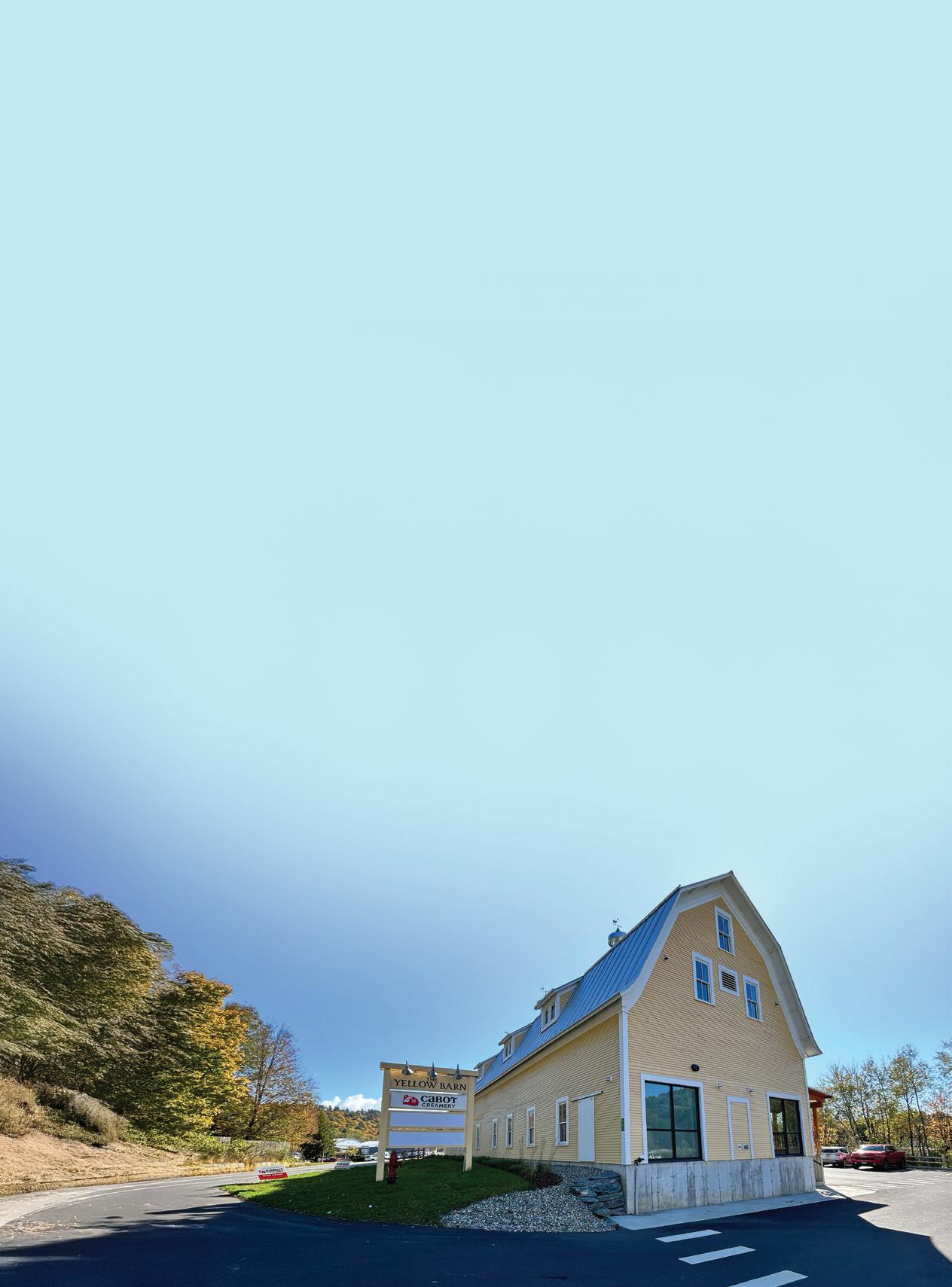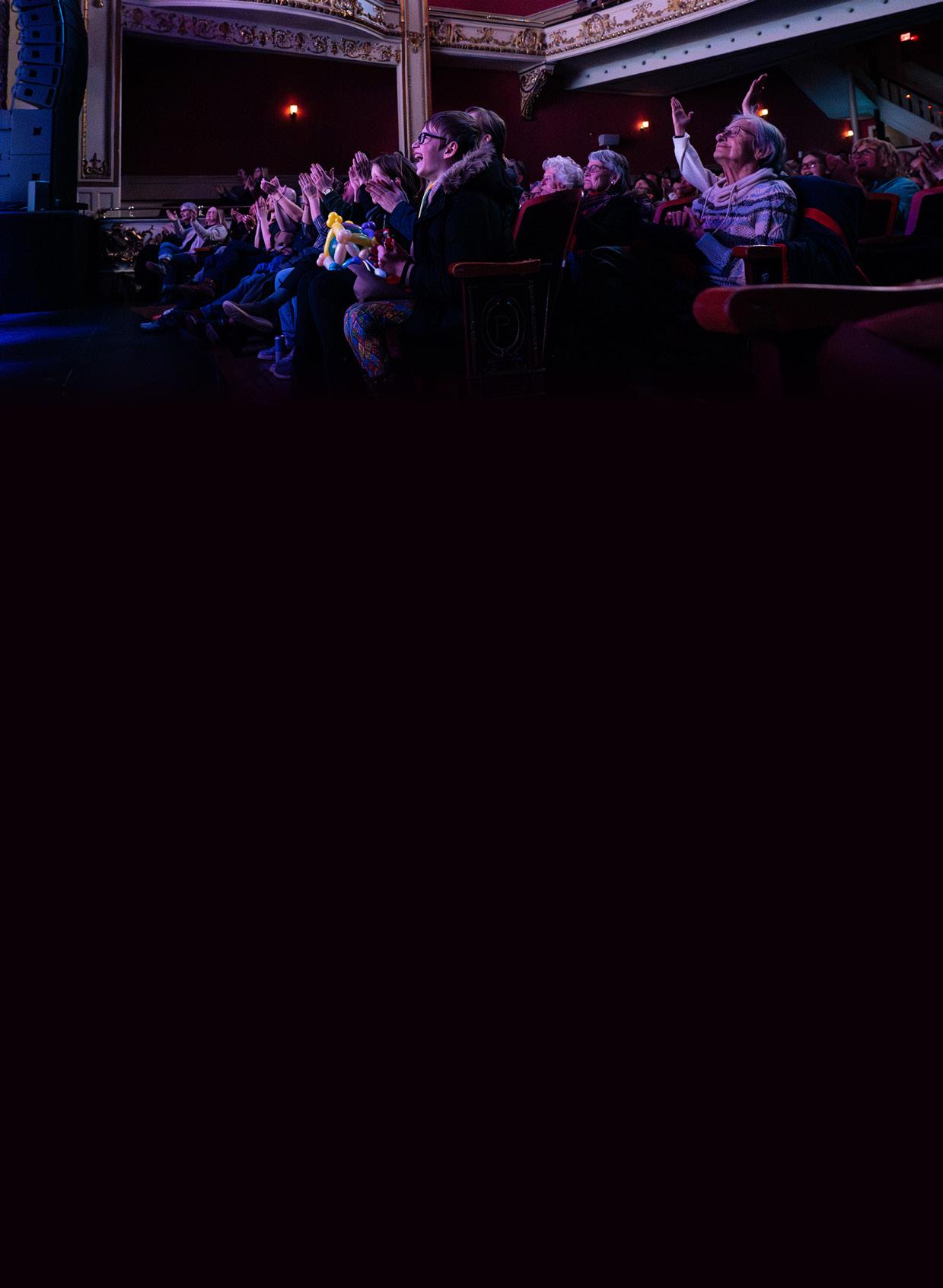

Mission Investing
2025 Report
ACROSS 55 MISSION INVESTMENTS as of March 2025

Since 2001, the Vermont Community Foundation has been a leader in committing a portion of managed funds to mission investing—using assets to create positive social and environmental impact. As one of the first community foundations in the nation to commit to this approach, we have consistently invested in projects that revitalize downtowns, create affordable housing, support local businesses, promote clean energy, sustain the working landscape, and create jobs across Vermont.
Mission investing is a powerful complement to grantmaking, aligning with our values and advancing our mission to close the opportunity gap. When you establish a fund with us, five percent of your assets are invested in the Vermont Investment
Pool. This means your investment is building stronger, more equitable communities and creating a more vibrant, sustainable future for all Vermonters.
Mission investing at VCF delivers a return that is far more than just financial. At VCF, we are not only investing capital; we are creating lasting impact that will benefit generations to come.
“Making a grant says, ‘I see the need.’ Making an investment says, ‘I see your potential.’”
- Dan Smith, President & CEO
Jon Ramsay shares Yellow Barn project updates with VCF staff
Amplifying Impact with a Mission Investing Fund
A VCF Mission Investing Fund (MIF) is an innovative tool that allows you to invest charitable dollars in for-profit, mission-aligned Vermont businesses. Contributions to a MIF are fully tax-deductible, and 100% of the fund’s assets are invested in the Vermont Mission Investment Pool for a set term. This structure puts charitable dollars to work immediately in Vermont’s economy—supporting entrepreneurship, affordable housing, vibrant downtowns, clean energy, and more. At the end of the investment term, the remaining balance, net of investment performance, can either be used for grantmaking or reinvested in the Vermont Pool.
Frequently Used Terms
Opportunity Gap: The divide that leaves too many Vermonters struggling to build bright futures no matter how hard they work
Mission Investments: Designed to generate both financial and social returns and made in alignment with the Foundation’s mission, values, and areas of focus
Place-Based Investments: Designed to generate both financial and social returns with a focus on a specific community
Venture Capital: Investments in early-stage companies, often in exchange for equity stakes in those companies
Equity Investments: Shares or partial ownership of a company expected to generate dividends as the company grows
Fixed Income: Investable funds loaned with a fixed rate of return
Mutual Funds: Money pooled from multiple investors and invested in securities such as stocks, bonds, and short-term debt

“The
people at the Vermont Community Foundation are community members, and they immediately understood our situation. They understood the social impact of investing in our co-op because they could see our value to the community.”
- Rose Paul, Plainfield Co-op President
As a for-profit business, the Plainfield Co-op isn’t eligible for grants. However, a $75,000 bridge loan from the VCF mission investing program enabled the co-op to purchase the Plainfield Hardware building, moving the co-op out of the flood zone and into a location in the heart of the community with increased foot traffic. A follow-up $150,000 loan from VCF allowed the co-op to stock inventory for the new location, which includes a greenhouse offering vegetable starts, flowers, and gardening supplies, and continues to operate the hardware business.
Photo Credit: 7D Brand Studio
Philanthropy Meets Venture Capital
VCF at Hula is an innovative partnership with The Fund at Hula that allows donors to direct charitable dollars into an entrepreneurial eco-system that is driving job creation and innovation in Vermont.
Headquartered in Richmond, VT, Greensea IQ is pioneering the use of robot intelligence to clean ship hulls, reduce carbon emissions from ocean liners, and detect undetonated landmines in turbulent surf zones. Their mission—to drive technical advancement on and under the world’s oceans that is “more efficient, safer, and for the protection of earth and humankind”—is, in part, fueled by philanthropy.
Greensea IQ is one of the most recent investments made by the VCF at Hula Fund, a venture fund that channels charitable assets into startups that are building and scaling here in Vermont.
“Our focus is on backing innovative founders with diverse skill sets who are solving realworld problems and growing impactful businesses in Vermont and beyond.”
- Jesse Curran, The Fund at Hula Vice President

Launched in 2022, the VCF at Hula Fund invests in high-potential startups developing scalable solutions that create new jobs, economic opportunity, and positive community impact across Vermont. Through this collaboration, investment returns are channeled back into the charitable funds that participate, enhancing grantmaking capacity, and fueling philanthropic support of entrepreneurship and community development.
“Greensea was a strong fit given its dual impact on global connectivity and environmental sustainability,” said Jesse Curran, vice president at The Fund at Hula. “They deliver both economic and environmental returns—the kind of impact we aim to back.”
Representing a dynamic cross-section of Vermont’s innovation landscape, the VCF at Hula portfolio currently includes Greensea IQ, Biocogniv, Benchmark Space Systems, Upright Education, Syntensor, and Coremap.

increase in deliveries 2024-2025 800% projected increase in deliveries 2024-2026

Modular. Mobile. Life-Changing.
WheelPad is redefining accessible housing and helping keep families together.
In 2010, Julie Lineberger received the devastating news that her godson, Riley, had been in an accident that left him with tetraplegia, all four limbs and his core paralyzed. As his long recovery progressed, Julie watched him struggle to find accessible housing.
She and her husband, architect Joseph Cincotta, designed a renovation for a home Riley purchased. In the interim, however, Riley lived in a motel room— the only accessible option available. During that process, Joseph asked Riley, “What if there was an accessible bedroom and bathroom on wheels that could have been attached to your mom’s or brother’s house so you weren’t so isolated?” That question was the humble beginning of WheelPad.
Located in Wilmington, WheelPad’s mission is to keep families together. Their customers are veterans, people recovering from spinal cord injuries or severe illness, and elderly individuals who want to be near family. The fully accessible units attach to a home through an existing door or window and can be removed if no longer needed.
In 2024, WheelPad delivered six units. In 2025, they will double or triple that number—a trend RJ Adler,
director of growth, anticipates will continue. “The demand is there,” he said. “It’s having supply that’s the challenge. The hardest thing is getting a call from someone in a spinal recovery care center who is ready to go home and so excited to have found us, and we can’t get them a product for three months.”
Through an investment from the Vermont Community Foundation, WheelPad is stocking key components, including heat pumps, windows, and accessibility features that will shorten the manufacturing turnaround.
The Vermont Community Foundation provided WheelPad with a $600,000 loan as part of its mission investing portfolio.
“Shelter is one of the most basic human needs, especially for individuals who are dealing with a life-changing injury or illness. The faster we can get these units out the door, the better.”
- RJ Adler, WheelPad Director of Growth
Photo Credit: Erica Houskeeper
Vermont-Grown Innovation
The Yellow Barn Project is driving economic opportunity in Hardwick and showing what’s possible when communities invest in local food systems.
Last September, under bright blue skies, cheesemakers, farmers, entrepreneurs, and local officials gathered to celebrate the Yellow Barn Project—a collaborative, public-private, multi-year investment in the future of Hardwick, Vermont.
The project both celebrates and accelerates the Northeast Kingdom’s food and farming community, reaffirming Hardwick as one of the region’s most important food hubs. Situated at the entry to the village and along the Lamoille Valley Rail Trail, the Yellow Barn Project is home to the Center for an Agricultural Economy (CAE) Food Hub, Jasper Hill Creamery, and Cabot Cooperative Creamery’s new retail space.
While visitors shop for cheese, local honey, and farm fresh veggies, farmers are delivering crops to the adjacent 22,000 square-foot Food Hub to be stored and, eventually, distributed to institutions and grocery stores around the Northeast. Credited with creating or saving 150 farm jobs, the facilities are moving products from over 100 local farms to more
than 500 markets weekly, while the accelerator provides space for farm- and food-based businesses to grow, develop new products, and improve exports to external markets.
“The Community Foundation was a pivotal partner in bringing the seven-year Yellow Barn project over the finish line,” said Jon Ramsay, executive director of CAE. “We could not have completed the construction of the Food Hub without their financial support.”
“With the Food Hub operational, CAE is positioned to better support farms and the movement of local food across Vermont.”
- Jon Ramsay, CAE Executive Director
As part of the Community Foundation’s long-term strategy to promote community vitality, the Yellow Barn Project was supported by grants from both donor advised fundholders and discretionary funds, as well as over $1 million in mission investments in the form of loans over five years.

$12.5M in local products moved from farms to people
150
farm jobs saved or created (2020-2025)
Setting the Stage in Rutland
An expansion at the Paramount Theatre is demonstrating that the arts aren’t just good for the soul, they’re good for the economy.
“We see ourselves not only as an art center,” said Eric Mallette, executive director of the Paramount Theatre in Rutland, “but as the heartbeat of the economic barometer in town.”
That’s not just conjecture. A national study on the economic impact of nonprofit arts centers found that people who attend a cultural event in Vermont spend an average of $28 to $51 per person above and beyond the ticket price on food, childcare, parking, and hotels.
As the Paramount Theatre breaks ground on a longplanned expansion into the Richardson building next door, Eric points to how the project will impact downtown economically. “The expansion is projected to bring in an additional 20,000 patrons a year,” he said, “with around 40 percent coming from outside Rutland County.” The study, noted Eric, attributes the higher per person spend to non-local patrons.“Those dollars go right into the local economy supporting restaurants, hotels, shops, and retailers.”
The two-phase renovation will greatly improve the patron experience, says Eric. Phase one will add

60K visitors per year
$2.5M impact on local economy
concessions, restrooms, and more functional lobby space. Phase two will convert the upper floors into “unconventional” spaces that can be used for smaller theater productions, conferences, or meetings.
“We can color outside the lines and provide what the community needs,” explains Eric. “We can host 150 lawyers during the day and a slam poetry event that evening.”
Much of the funding for the project is coming from pledged donations arriving over time. “That’s challenging in the construction world where bills arrive every 30 days,” he adds. “The investment from the Community Foundation allows us to bridge those gaps and make more intelligent, cost-saving decisions.”
Of course, an art center is never solely about financial return. “We can all sit at home and watch Netflix,” said Eric, “but there’s something to be said for having an experience in a room with 850 other people.
“There’s a connective thread that weaves through every person, and it’s an appreciation for the
performance.”
- Eric Mallette, Paramount Theatre Executive Director
The Vermont Community Foundation provided the Paramount Theatre with a $600,000 loan as part of its mission investing strategy.


Establish a Mission Investing Fund at
To learn more about mission investments at the Vermont Community Foundation visit vermontcf.org/mission-investing or contact us at philanthropy@vermontcf.org or 802-388-3355 opt. 5 to be connected with one of our philanthropic advisors.
